The Roux-en-Y gastric bypass surgery, or simply gastric bypass, is a type of weight-loss surgery that involves creating a small pouch from the stomach and connecting the newly created pouch directly to the small intestine. After gastric bypass, food will travel down into this small pouch of the stomach and then directly into the small intestine, thereby bypassing most of your stomach and the first section of your small intestine.
Gastric bypass is considered to be the gold standard of bariatric surgery and is one of the most commonly performed weight loss surgeries. Gastric bypass is recommended when weight loss has been unsuccessful with diet and exercise, or when you have serious health problems because of your weight.
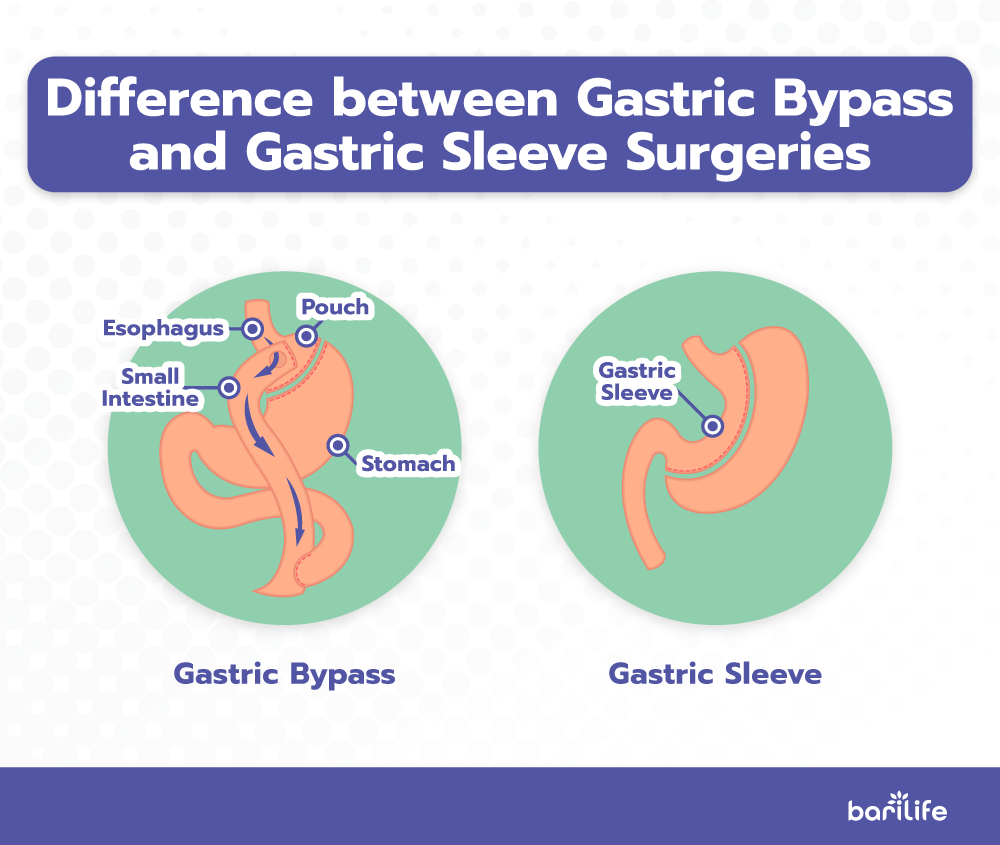
Successful gastric bypass results
Gastric bypass success rates change over time as more and more time passes after surgery. In the first years, the success rate is extremely high, with the vast majority of patients losing 50% or more of their excess weight.
However, in one study, weight regain was observed within 24 months after surgery in approximately 50% of patients.
There are several markers that can indicate a successful outcome. These include: percent excess weight loss (%EWL), improvement in obesity-related health conditions, or comorbidities, and overall weight regained over time. Let’s take a closer look at each of these.
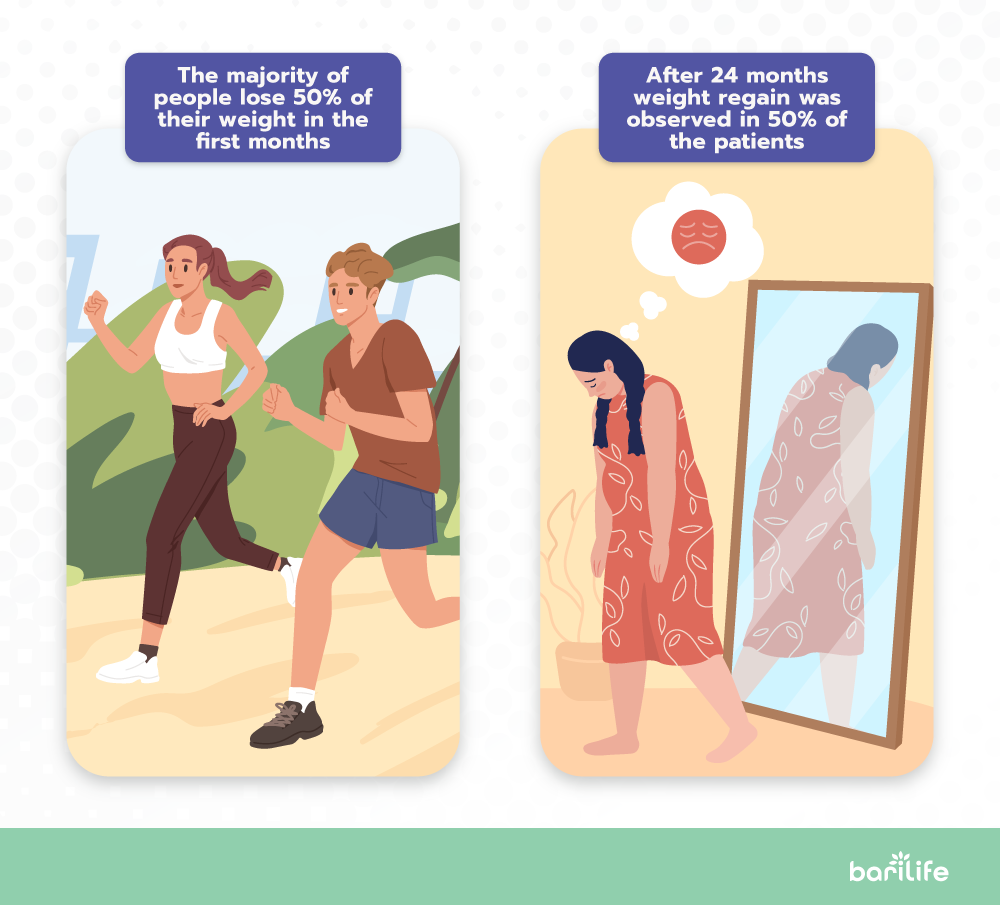
Percent excess weight loss
The percent excess weight loss, or %EWL, is a common marker used throughout the industry to compare not just gastric bypass results, but weight loss outcomes of all bariatric surgeries.
Excess weight is first determined by subtracting the patient’s ideal body weight from their body weight prior to surgery. The remaining amount is excess weight beyond their ideal body weight. Any weight the patient loses post-surgery becomes a percentage of excess weight. For example, if an individual had an excess body weight of 75 lbs, and that same individual lost all 75lbs, their percent excess weight loss will be 100%. For an even more detailed understanding of excess body weight, take a look at this article.
What % does EWL constitute successful gastric bypass results? Weight loss varies from patient to patient, but there is some data on how much is lost on average. About 3 months after gastric bypass, patients can expect 25-35% EWL. At around 6 months post-surgery, patients can experience, on average, a 45-55% EWL. At around 18 months after surgery, the most successful patients lose about 75-80% of their excess body weight. Therefore, if your gastric bypass results are similar to these, then your gastric bypass surgery would be considered successful.
Obesity itself is associated with many health conditions such as:
- Diabetes
- High blood pressure
- High cholesterol
- Fatty liver disease
- Gastroesophageal reflux disease
- Arthritis/joint pain
Deciding to have gastric bypass surgery can be an important step towards improving one’s overall health and well-being. After surgery, patients often experience an improvement and sometimes even complete resolution of many of these health problems following weight loss.
For example, one study showed that 48% of patients had full remission of type 2 diabetes mellitus 24 months post gastric bypass surgery, while 72% experienced partial remission. Another study showed significant improvement in high blood pressure in patients, with 44% of patients no longer requiring medication for hypertension. Other outcomes include improved cholesterol levels, improvement or remission of fatty liver disease, and complete resolution of joint pain. For many, gastric bypass results in improved overall health for most.
Gastric Bypass Weight Loss Calculator
Use this calculator to see what weight loss you can achieve after gastric bypass surgery. This is based on average numbers you could lose more (or less).
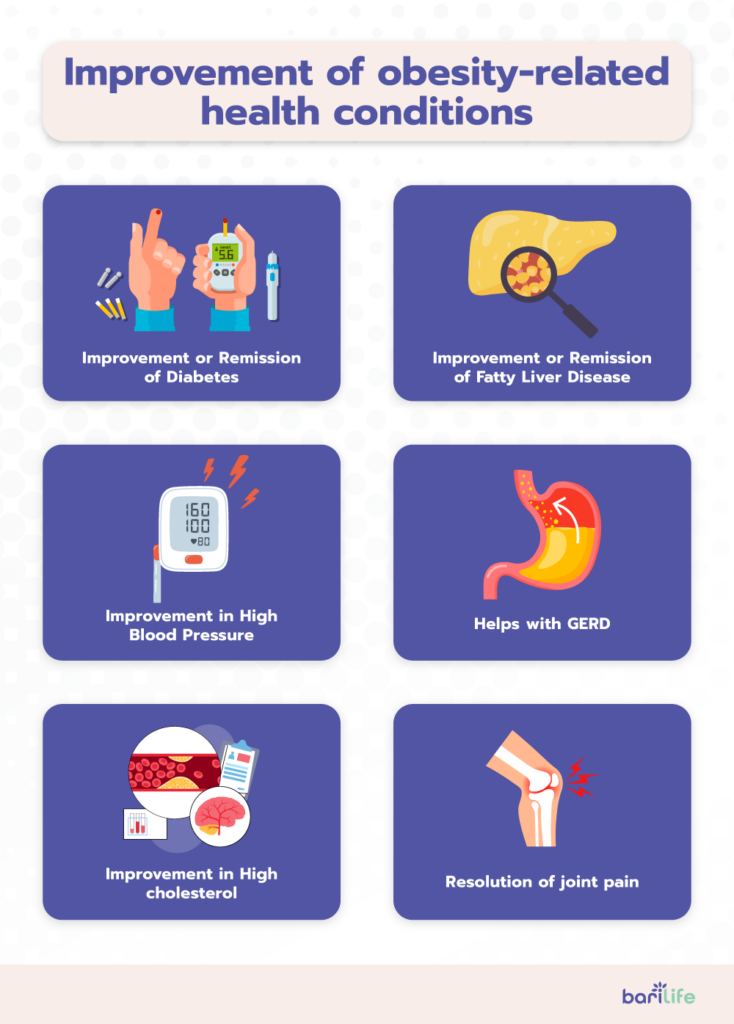
Weight regained over time
The last sign of a successful gastric bypass surgery is the amount of weight a patient regains over time. After losing a very large amount of weight initially, it is common to have some of that weight return. However, it is important that the weight gained in the years after gastric bypass surgery is minimal.
Research shows that up to 20% of all RYGB patients experience significant weight regain. Weight regain can be anywhere from around 5% at two years after surgery, all the way up to 75% or more by six years. Gastric bypass results are determined by many different factors, but the good news is, you have the ability to control many of them. Keep reading to learn how you can decrease your risk for postoperative weight regain.
There are a few different reasons why some people experience better gastric bypass results than others, here are some of them:
- Not following the surgeon’s postoperative recommendations. The weeks following surgery are extremely important for proper healing, overall health, weight loss, and successful gastric bypass results. The surgeon will recommend a gradually liberalized 4-phase diet. The first phase of the post-op diet is only liquids, and is the most calorie-restricted phase of the diet. There are specific guidelines for slowly returning to solid foods.
- Returning to old eating habits. This may seem obvious, but reverting back to previous eating habits that led to the original weight gain will cause more weight to be regained. Patients may feel comfortable in their weight loss and slowly fall back into old habits.
- Not maintaining a consistent exercise routine. Physical activity is a crucial part of your weight loss journey. It is important to stay consistent with both cardiovascular and resistance training exercises to optimize long-term weight loss and prevent weight regain.
Data suggests that certain behaviors are especially linked to weight regain post bariatric surgery:
- Binge eating
- Grazing
- Eating large quantities of food
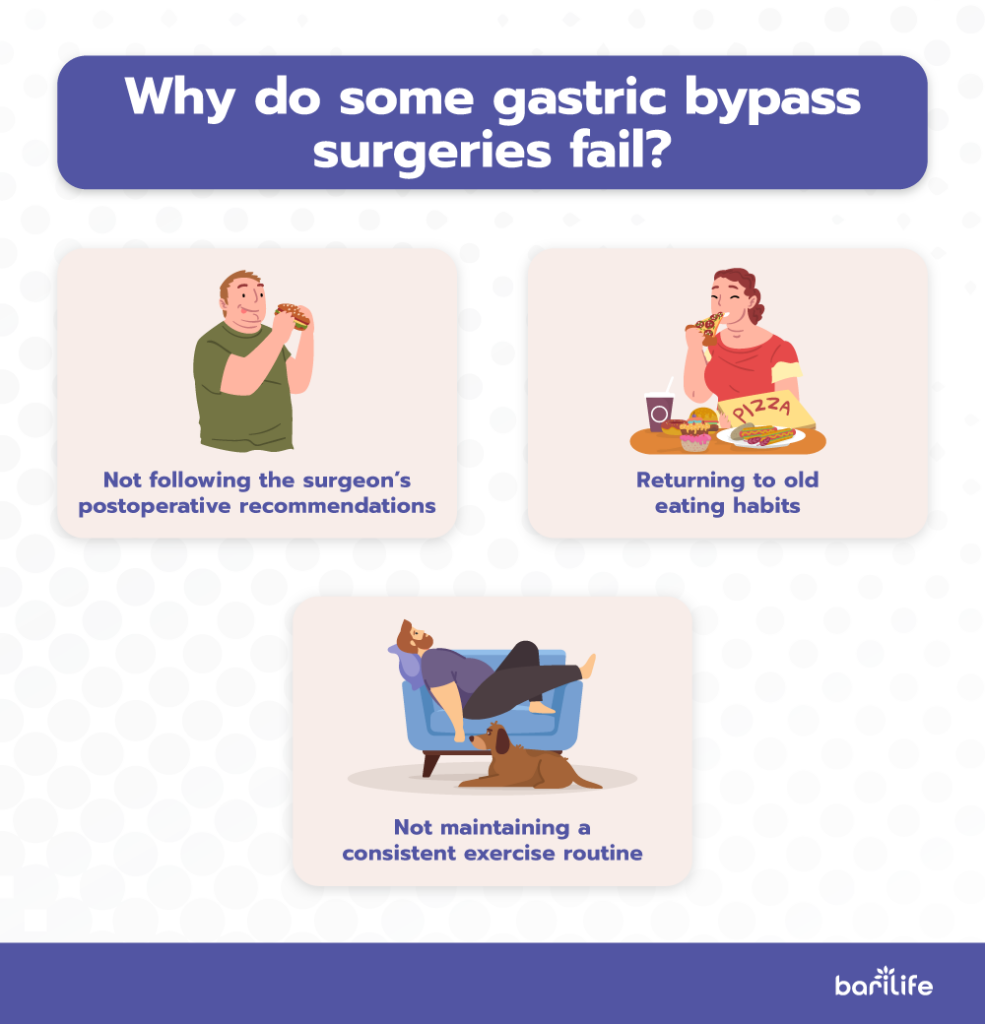
What can I do to ensure my surgery is successful?
Making sure you don’t fall into the above mentioned habits can significantly improve your gastric bypass results. Let’s review:
- Follow your doctor’s post-surgical recommendations as closely as possible
- Make lifestyle changes to continually support your healthy habits and avoid triggers that will cause you to fall back into old eating patterns
- Consider professional counseling to help you navigate these changes effectively, especially if you are finding yourself binge eating, grazing throughout the day, and/or eating larger portions of food often
- Start and remain consistent with a regular exercise routine as soon as you get clearance from your surgeon
- Do your research. When electing to undergo gastric bypass surgery, choose a well trusted and respected surgeon in the field of bariatric surgery
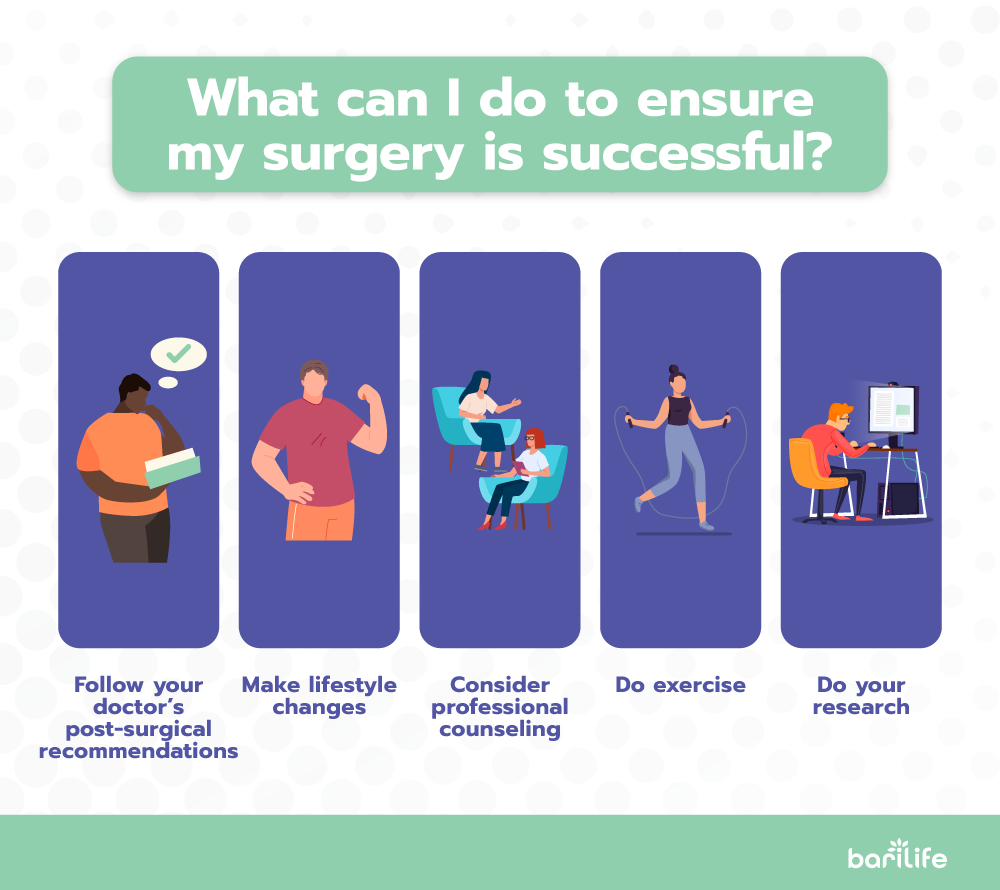
In short
Deciding to have bariatric surgery is a big decision. Once you’ve decided to go ahead with gastric bypass, it is understandable that you would want to do everything possible to help you achieve the best gastric bypass results. A successful gastric bypass can be measured by percent excess weight loss of 45-55% at six months and 75-80% at 18 months.
Successful gastric bypass surgery will also improve or resolve obesity-related health conditions such as diabetes, high blood pressure, high cholesterol, fatty liver disease, gastroesophageal reflux, and even joint pain. Additionally, maintaining post-surgical weight loss with minimal weight regain is an indicator of a successful gastric bypass surgery.
A patient will be most successful in avoiding a failed gastric bypass surgery if they closely follow their surgeon’s recommendations, maintain healthy eating habits, engage in regular physical activity consistently, seek professional counseling, and choose a trusted bariatric surgeon to perform their gastric bypass procedure.
Although some surgical outcomes are uncontrollable, in general, the patient’s behaviors after surgery make all the difference in supporting positive gastric bypass outcomes.




What are your tips and tricks to post-bariatric success?